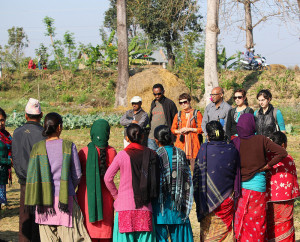Annual Innovation Lab Council Partners Workshop: Nepal, March 10 – 14, 2014

Agrilinks Site Visit to Naubasta VDC in Banke District Nepal, IPM Innovation Lab Validation Trial Site. Photo credit: Agrilinks
The March 2014 Annual Innovation Lab Council Partners Workshop “Scaling Up Agricultural Research and Technologies & Designing Research for Improved Nutritional Outcomes” brought together members of the Innovation Lab community and USAID/Washington and Mission staff. The workshop was held on March 10-12 in Kathmandu, Nepal. The objectives for the workshop included:
– Understanding the principles and processes of scaling agricultural technologies
– Improving connections and collaborations between Innovation Labs, Mission value chain programs and other USAID research programs
– Identifying pathways through which improved nutritional outcomes can be incorporated into Innovation Lab research agendas
– Understanding how agricultural interventions and technology scaling can contribute to household nutrition outcomes (as opposed to simply scaling nutritious foods)
Following two days of plenary sessions (March 10 and 11) two field trips were organized, to Sindhupalchowk on March 13 and one to Banke and Bardiya districts March 12- March 14.
The workshop agenda and presentations are available below.
——————————————————————————————————————————————————————————————
Monday, March 10
Welcome and Introductions
1. Innovation Council Director (Jeffrey K. Griffiths)
2. USAID BFS/ARP Office Director (Robert Bertram)
Welcome to Nepal
1. USAID Mission Director (Beth Dunford)
2. Government of Nepal Joint Secretary (Ministry of Food and Agriculture: to be suggested by the Mission)
Introduction to Missions and Mission Activities
- USAID Nepal (Danielle Knueppel)
- USAID Bangladesh (Osagie Aimiuwu)
- USAID Burma
- USAID Cambodia (Teffera Betru)
- USAID India (Bahiru Duguma)
- USAID Tajikistan (Aviva Kutnick)
- USAID RDMA (Regional Development Mission for Asia) (Kipp Sutton/Tania Tam)
Overview of the Feed the Future Innovation Labs (Saharah Moon Chapotin/Jeffrey K. Griffiths)
Highlights and Innovations in Research that have Potential for Scaling
Session 1: Scaling up Principles and Processes
- Setting the Stage on the concepts of Scaling up (Richard Kohl)
- Designing Research Programs for Maximum Impact at Scale (J. Vern Long)
- Scaling IPM Technologies in Nepal (Luke Colavito)
Session 2: Animals in Production Systems
- Fish Production Systems in Nepal (Madhav K. Shrestha)
- Livestock and Climate Change Research in Nepal (Richard Bowen)
- Chickens & Eggs: Low Hanging Fruit of Development (David Bunn)
- Cattle and Buffalo: Emerging Opportunity (Navin Hada)
Session 3: Sustainable Intensification and Risk Management Practices
- Scaling up technologies on sustainable agriculture and natural resources management (Adrian Ares)
- CSISA Bangladesh (Richard Rose) and CSISA Nepal/India (Andrew McDonald)
- Risk Management Tools for Agricultural Growth and Resilience (Sarah Janzen)
Tuesday, March 11
Session 4: Crop Improvement
- Developing climate resilient wheat varieties for South East Asia (Kulvinder Gill)
- Dry Grain and Legume (Dave Hoisington on behalf of Irvin Widders)
- Heat Stress Resilient Maize for South Asia project (P. H. Zaidi, CIMMYT)
- Increasing peanut production and reducing mycotoxin contamination (Dave Hoisington)
- USAID India: Addressing Crop Improvement (Srivalli Krishnan)
Session 5: Nutrition and Health
- The Contributions of Agriculture to Nutrition: Thought Experiments and Experimental Thoughts (Patrick Webb)
- Nutrition Innovation Lab Africa: Biological Insights into Malnutrition (Jeffrey K. Griffiths)
- Nepal’s Multi-Sector Nutrition Plan- What is the role of agriculture in meeting nutrition outcomes (Ministry of Food and Agriculture Representative)
- Feed the Future Innovation Lab for the Reduction of Post Harvest Loss (Paul Fox & Alfred Schmidley)
- Overview of FTF Asia Regional Aquaculture- Horticulture for Nutrition Program (Robert Bertram)
- USAID Bangladesh: Achievable Agriculture-Nutrition Linkages (Osagie Aimiuwu)
Session 6: Horticulture
- Introduction to the Horticulture Innovation Lab (Elizabeth Mitcham)
- Enhancing the impact of horticulture on poverty reduction and nutrition outcomes (Elizabeth Mitcham)
- Globalization of IPM Technologies and Management of Invasive Species (R. Muniappan)
- AVRDC: Home Vegetable Gardens (Warwick Easdown)
- USAID–Cambodia: Scaling up Commercial Horticulture (Teffera Betru)
Session 7:(Break out Session)
The aim of the session was to discuss current topics of interest in the realm of agriculture and nutrition.
1. Designing Agriculture Research Programs for Nutrition Outcomes – Facilitators: Maura Mack and Patrick Webb
2. Research Design Considerations to Ensure Future Scaling up Potential – Facilitators: Gerry Jahn and Richard Kohl
3. Policy Environment around Scaling up Agricultural and Nutrition Innovations – Facilitators: USAID Nepal policy representative
4. Integrating Animals into Production Systems- Facilitators: Shivaun Leonard
Session 8: Wrap up and Conclusions
FTF Asia Regional Aquaculture-Horticulture for Nutrition Program discussion and next steps
Wednesday, March 12
Closed Meeting of USAID BFS, USAID Missions and Innovation Lab Directors
Thursday and Friday, March 13-14: Field Trips
One day trip to Sindhupalchowk (Central Mountain district) to visit the activities of USAID Suahaara, an integrated program being implemented in 25 districts of Nepal.
Two day trip to Banke and Bardiya Districts (Mid-Western Terai districts) to visit the activities of USAID KISAN, Integrated Pest Management Innovation Lab, and CSISA.
